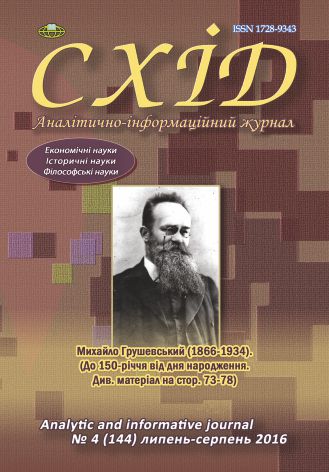Introduction to comparative Heidegger studies: American context
DOI:
https://doi.org/10.21847/1728-9343.2016.4(144).78098Keywords:
Heidegger studies, phenomenology, existentialism, reception, interpretation, pragmatismAbstract
The dynamics of Heidegger studies in international intellectual process is the real challenge for the Ukrainian scientific community that makes us look for effective means of generalization and learning context and the content of the problems that have defined the history of the world understanding of M. Heidegger. Comparative studies in the history of philosophy are one of the key areas of research activities that contribute to the identification of semantic coordinates of modern philosophical discourse. American line in reception of Heidegger's philosophy seems to have been based upon the German-French debate on understanding Heidegger, which has nevertheless obtained its own achievements in the reappraisal of the controversial philosopher. Being strongly influenced by the traditional American philosophical trends of pragmatism and analytical philosophy, reception of Heidegger's philosophy has undergone certain transformation of criticism into productive synthesis, which included several paradigmatic shifts. This movement was driven by critique of archetypical Heideggerian motives of poetics of Being and religion of language. The pragmatist and analytical appropriation of Heidegger's concepts and methodologies have been preceded by a long period of postmodernist hermeneutics. The vector of American Heidegger studies should be appropriated to the conditions of the Ukrainian philosophical process, where we have to reinvent the very ground-forming premises in their historical concreteness. The Marxist legacy of the former times should not be negated; it should be reinvented and restored as inherent basis of a novel mind-set.Downloads
References
1. Baumeister, A. (2012), Origins and Hidden Motives of Fundamental Ontology, Sententiae, Vol. XXVІІ, 46-59 (ukr).
2. Bohachov, A. (2011), Experience and Sense, Dukh і Litera, Kyiv, 336 p. (ukr).
3. Dakhnii, A. (2012), Destruction as method of hermeneutical phenomenology of Martin Heidegger, Herald of Lviv University: Philosophy Series, is. 15, 29-37 (ukr).
4. Dreyfus, H. L. (1991), Being-in-the-world: a commentary on Heidegger’s being and time, division I, The MIT Press, Cambridge, 384 p.
5. Kebuladze, V. (2013), Phenomenology and Hermeneutics in Contemporary Ukrainian Historic-Philosophical Research, Sententiae, Vol. XXIX, 46-59 (ukr).
6. Kolb, D. (1991), Heidegger at 100, in America, Journal of the History of Ideas, Vol. 52, No. 1, 140-151. doi: 10.2307/2709586
7. MacAvoy, L. (2013), Heidegger’s Anglo-American Reception. In: The Bloomsbury Companion to Heidegger, Bloomsbury, London, 425-432. doi: 10.5040/9781472548313.ch-053
8. Ballard, E. G. (ed.), (1973), Martin Heidegger: in Europe and America, Martinus NijhoffPublishing, The Hague, 204 p. doi: 10.5040/9781472548313.ch-053
9. Okrent, M. (1988), Heidegger’s pragmatism: understanding, being, and te critique of metaphysics, Cornell University Press, Ithaka, 314 p. doi: 10.1007/978-94-010-1981-1
10. Richardson, W. J. (2003), Heidegger: Through Phenomenology to Thought, Fordham University Press, New York, 810 p.
11. Rorty, R. (1991), Essays on Heidegger and others: philosophical papers, Cambridge University Press, Cambridge, 202 p. doi: 10.1017/cbo9780511609039
12. Sheehan, Th. (2016), The Reception of Heidegger’s Phenomenology in the United States, available at: https://www.academia.edu/26545151/The_Reception_of_Heideggers_Phenomenology_in_the_United_States
13. Woessner, M. (2011), Heideggerr in America, Сambridge University Press, New York, 308 p. doi: 10.1017/CBO9780511777998
Downloads
Published
How to Cite
Issue
Section
License
Copyright (c) 2016 Andriі Karpenko

This work is licensed under a Creative Commons Attribution-NonCommercial-NoDerivatives 4.0 International License.
1. Authors bear responsibility for the accuracy of facts, quotations, numbers and names used.
2. Manuscripts are not sent back.
3. The publisher does not always agree with the authors' opinion.
4. The authors reserve the right to authorship of the work and pass the first publication right of this work to the journal under the terms of a Creative Commons Attribution-NonCommercial-NoDerivatives 4.0 International License. This license allows others to distribute (copy) the published work for non-commercial purposes, provided there is mandatory attribution to its authors and a link to the first publication in our journal.
5. The authors have the right to conclude separate supplement agreements that relate to non-exclusive work distribution in the form in which it has been published by the journal (for example, to upload the work to the online storage of the journal or publish it as part of a monograph), provided that the reference to the first publication of the work in this journal is included.

